- Home
- Andre Dubus III
Townie Page 17
Townie Read online
Page 17
7
IN THE SUMMER, Salisbury Beach was where you went if you had wheels, especially on Friday or Saturday night. It was a sandy strip of barrooms and open arcades, pool halls and dance clubs and carnival rides. There was a roller-coaster built entirely out of wood, bleached four-by-fours that one day would rot and they’d tear it down, but in the late seventies you could hear the rattle of the cars all night long, the cries of riders as they plummeted down one steep slope and got jerked up another. There was the bass thump of DJ music through the thin walls of the Frolics, the boxed roll and ping of steel balls in the pinball machine, the hard-cornered slap of plastic air hockey pucks, talk and yelling, little kids laughing or pleading, the creaking of gears beneath the huge lighted Ferris wheel. There were the revving motorcycle engines, their diesel-fed clacking of steel on steel. There was the electric whine of the Dodge ’Em cars, the buzz of neon lights, and the constant slap and hiss of waves breaking on the dark beach. You could smell motor exhaust and seashells and spun sugar. There was smoking beef and overheated Fry-O-Lator oil and fried dough and butter from a bottle. There was the tang of dried ketchup and mustard on the asphalt, cigarette smoke and bubble gum and suntan lotion and sweat.
It was a Sunday night, and Jeb and I were there with Sam and his girlfriend, April C. The strip was crowded with sunburned families in shorts and T-shirts, their flip-flops slapping their feet. There were tanned, bare-chested boys. Their shirts hung from their shorts pockets as they lounged around a bench or stood in a circle watching girls go by in halter tops and hip-huggers or bikini bottoms that barely covered their asses. Fifteen or twenty bikers leaned against their Harleys or Indians or Nortons, smoking cigarettes, their faces lined and whiskered and windburned. Most of them had long hair held back with a bandanna, and they wore black T-shirts with a neon wolf engraved across the chest, or Old Glory, or a bald eagle flying into a sunset, or no T-shirt at all, just a leather vest, some of the men muscular and tattooed, others scrawny as bar rats. Fifty yards away, a Salisbury police cruiser was parked up against the sidewalk in front of the shops selling beach towels and bathing suits and shot glasses with the wooden roller-coaster painted around it, but the cruiser was always empty, the cops walking around three or four at a time, their blue uniform shirts unbuttoned, rings of sweat under their arms.
Beyond the bikers was a gap in the pool halls and dance clubs you had to pay to get into. All these clapboard buildings along the water were built on piers, their bases covered with white barnacles, and through the gap I could see the black ocean, the dim white tops of waves curling into the sand. The Frolics was to the left. Even above all the noise I could hear the band from inside, the muffled but amplified cry of the lead singing “American Woman.”
The beach sand here was cool and coarse and littered with empty cigarette packs and ketchup-streaked cardboard containers and dried seaweed. Still, I wanted to see the ocean at night, and I stepped past the bikers onto the sand. I didn’t know where Sam and April had gone, but Jeb was wandering somewhere behind me and up ahead were two girls and a guy. He wore a tight white T-shirt, his arms lean and marked with home-made tattoos. He had a crew cut, which no one but soldiers had then, and the girls with him wore tube tops and too much makeup. They looked young, fourteen or fifteen. He was talking fast, inhaling deeply on a cigarette, pointing his finger at one, then the other, “So fuck you and fuck you ’cause I’m not takin’ any more a your fuckin’ shit, all right?”
I should’ve kept walking. I should’ve minded my own business, but I didn’t like how he was talking to them, and there was the headlong pull I’d been feeling since Steve Lynch that every moment like this was a test and the more tests I passed the further I permanently moved myself from the boy I’d been. “Hey, watch your mouth.”
“Yeah? Let’s take a fuckin’ walk.” He flicked his cigarette and scanned the strip for cops and now his hand was squeezing the back of my neck and I let him keep it there, let him think I’d be easy for him as we both walked over the sand into the shadows under the Frolics where I twisted away and threw one at his face, but he ducked and my fist skimmed the top of his skull and he got low and drove me down, the sand slamming my shoulder blades, then he was on me, swinging at my head and face, and I arched my back and started punching him in the shoulder, the ear, my wrist suddenly squeezed by iron, a bright light in my face, this kid pulled off me by more bright light, my wrist being slowly vised by the steel claw the first cop had put on me, a device that closes around bone as tightly as it’s pulled, and the big gray-headed cop was yanking me out from under the Frolics, my eyes tearing up, the lighted strip a blur, and I was crying, “I’ll walk. I’ll walk. Okay, okay, okay, I’ll walk.”
But he jerked all the harder, my arm a hot cord to my shoulder and neck and I stumbled over the sand as fast as I could. The one I’d fought was handcuffed in front of me, a big cop at each arm, and they were talking to him like they knew him well. They kept calling him Jimmy, their .38s bouncing in their belts as they hit the asphalt and the strip was brighter than before, louder, and I could feel people looking at us, heard Jeb call my name as the back doors of a paddy wagon opened and the two cops ahead of me tossed in the crew-cut one and the claw let go and I was lifted inside, the doors slamming shut, then the roll away from the beach.
I was on a metal bench next to a sleeping drunk. The only light came in from two high slits in the doors, neon carnival light moving by outside. Jimmy, still cuffed, sat across from me, his hands behind his back while my hands were free. My wrist was hot and swollen and I tried to move it but couldn’t.
“You still want to go at it, motherfucker? ’Cause I don’t need hands to kick your fuckin’ head in, you piece of shit.”
Part of me couldn’t believe he was calling me on. I could start in on him with my left and he wouldn’t be able to do anything about it.
He was leaning forward, a white torso and head. “You think I’m shittin’ ya? Try me. Try me, mothafucka.”
I felt nothing. No fear. No anger. No need to prove myself. Whatever fight had been in me was gone. So was my shirt, the metal wall of the wagon sticking to my back. I looked at him, this kid really, this angry kid all the cops knew by name. Angrier than I was, meaner, and he’d gotten the best of me back there. The same way the one did the winter before in the parking lot of the Tap, by wrestling me down. I wasn’t good at it. If I couldn’t throw hard fast punches I was lost. And if the cops hadn’t broken up me and this Jimmy, he would’ve beaten the shit out of me.
I shook my head. “Say what you want. I don’t have much time anyway.”
“What?”
“Three months. That’s it.”
“What do you mean?”
“Cancer. It’s in my bones. That’s what the doctors say anyway. I just came here to have some fun, that’s all.”
“You gotta be shittin’ me.” His voice was hard, but his face was softening.
I shook my head, looked down at the scratched steel floor. I didn’t know where these words came from or why I’d said them.
“Aw, man, but you got muscles, I mean, your health, right?”
I shook my head again. “That’s just on the outside.” I looked back at him, and it was like looking into the face of a small boy, his mouth opened slightly, his eyes on me but also on himself, on his own, hopefully distant, mortality. “Oh, man.” He leaned forward. “Listen, soon as these fat fucks open the door, you book it. Believe me, I do it all the time. They’re too slow to ever get you.”
I nodded. My wrist didn’t hurt as much and I began to rub it, moved it up and down and side to side. I felt guilty about my lie but could see its power too, see how quickly it had disarmed him. The drunk mumbled something. The police wagon was backing up now. No light came through the slits, then there was a yellow glow.
“Lookit, I’ll keep ’em busy and you take off, all right?”
“Thank you.”
He nodded at me, shook his head and winced at my fate, his eyes on
the doors as they opened and only one cop stood there. It was the one who’d put the claw on me. Jimmy was up off his bench. “Officer Frank,” Jimmy turned his back to him, “these are a little tight tonight. Can you just loosen ’em one notch, please, that’s all I ask. One notch.”
“Get closer, Jimmy. Squat down.”
Jimmy did, his eyes on me. He mouthed, Go, Go. And he motioned his head toward the open doors and the station house in electric yellow light, a short fence, then the beach, the dim white surf. I didn’t move.
THE CELL was four feet wide and eight feet long, and I was in there with five other men. But not Jimmy. I was around the corner getting escorted down a short yellow hall to my cell when I’d heard it, shouting and the scuff of feet, the front door slamming back against the wall. Weeks later I heard they’d shot a kid that night, chased him down under those clubs on the beach and put one in his hip.
The cell was crowded when the cop pushed me in, so I stayed by the door and leaned against the bars where the only light was. In the gloom, three men sat on the steel bunk bolted into the wall. I didn’t look long, but there was one with scraggly hair and a beard, another wearing glasses and blue Dickies work pants and janitor shoes. There was a fat one with no shirt, and using the toilet as a seat was a blond kid talking in a low voice about dust, the best you’ll ever have.
The drunk I’d come in with was sitting on the floor near the bars, his back to the wall, his chin to his chest.
I leaned against the bars in the hallway light, shirtless. I hoped I looked big enough, or at least fit enough, to stay away from, and I was aware of my head now, a pulsing at my right temple, a new bruise. I knew I had a phone call coming, that I was in line for that. What I didn’t know is that Jeb and Sam and April C. were in the station a wall away trying to bail me out. Jeb, with his frizzy mane and unshaven face, had asked the desk sergeant how much.
“Sixty bucks.”
“Sixty bucks?”
“That’s right.”
“Where does that money go?”
“Excuse me?”
“I said where does that money go?”
“In my pocket, wise ass, now beat it.”
“No, I’m not leaving.” Jeb sat in a chair and crossed his arms. Two cops picked him up and hauled him to a cell not far from mine.
Out in the booking room, Sam approached the lieutenant on duty. “Please, Officer, there’s no need of that. I’ll get him out of here.”
“You want to get arrested too?”
“No, but he didn’t do anything, sir.”
April tapped Sam’s shoulder. “C’mon, honey. Let’s go.” Sam turned to leave, but his head got yanked backwards, the cop’s hand in his hair. “You’re going in too.”
“No, I’m not.” Sam reached up and grabbed the cop’s wrist, but the cop wasn’t letting go so Sam used his neck muscles to let the cop pull out his hair, and he grabbed the cop’s other wrist and walked him back against the wall, pinning both hands, the cop yelling and swearing and calling for help.
“I’m going to let go and walk out that door, all right? I’m just going to let go and walk.” But now there were two more cops on him, and in seconds Sam was in the cell with Jeb.
None of this I knew about. One of the men in my cell was snoring. The drunk at me feet looked dead, both palms upturned on the concrete beside his legs. In another cell, a man kept shouting through the bars for a drink. “I just need a fuckin’ drink!”
Every fifteen minutes or so, a cop would unlock a cell door and escort a man to a pay phone. New men were being brought in too. One was young and tall and sunburned, and his escort cop ran him facefirst into the concrete wall, then tossed him in the last cell. From where I leaned against the bars, I could see the fresh blood-streak, could smell piss and sweat and old wine.
“You.”
This cop was older, his hair gray. On his forearm was a U.S. Navy tattoo and he unlocked the cell and told me to stay put while he locked it again, then he gripped my elbow and walked me around the corner to a pay phone. “One call, five minutes.” He handed me a dime and stepped back to where he could see the row of cells, his hands on his hips. I pushed in the dime and called my father.
Part of me was surprised I was calling him. It was my mother I lived with. My mother who knew we’d gone to the beach, my mother who would be home. And Pop had gotten married again. To a woman he’d dated back in high school in Louisiana. He’d flown down there to see his mother, heard that Lorraine was a widow now with two young kids, and he asked her to meet him at the airport for breakfast, a meal that lasted three hours, and at the end of it, after not having seen or spoken to each other in over twenty years, they were engaged. To celebrate this, Mom had him over to dinner, the six of us sitting at that table we used only for holidays, Pop at the head of it. He sat straight, his napkin in his lap, and he chewed slowly, thoughtfully.
“So you’re getting married,” Mom said.
He nodded. “I’m coming in from the jungle. I’m tired of being out there in that jungle.” He sipped his wine, and I chewed my roast chicken and wondered what I’d missed; didn’t he live on a green, walled-in campus? What jungle?
Jeb and I were best men at his wedding. Jeb and Pop wore jeans or corduroys, but for some reason I rented myself a white tuxedo with tails, and we walked our father to the chapel across the small campus where he lived in faculty housing. Now he lived there with Lorraine and her daughter and son.
The phone was ringing. Standing shirtless in the Salisbury jail, my wrist and knuckles and temple sore, I knew why I was calling him; I felt proud.
“Hello?” It was Lorraine. She was a small-boned woman who smoked More cigarettes one after the other, but she always seemed to wear just the right amount of makeup, her hair short and stylish, her voice tobacco-deep, her southern Louisiana accent stronger than my mother’s and father’s. I asked to speak to Pop.
“Honey, he’s in bed.”
“Can you get him, please? It’s kind of important.”
I waited a minute or two. The cop was looking at me. He glanced at his watch.
“Andre?” My father’s voice sounded funny, as if he’d come to the phone from far away and wasn’t sure of anything.
“Pop, I got in a fight and need to get bailed out of jail. I’m at Salisbury Beach.”
The line was quiet. For a second I thought he might be mad, a possibility I hadn’t even considered.
“Dad?”
“I took a pill, son. To sleep. You need to call your mama. I can’t drive right now, man.”
“Okay.”
“’Kay. G’night.”
I hung up. I looked at the black receiver. I was about to turn to the cop to ask for one more dime, but he had my elbow and was walking me back to the cell.
“My father can’t come get me. I need to call my mother.”
“One call, that’s it.”
“But I didn’t call anyone.”
“That’s not my problem.” The cop unlocked the cell and pulled the steel door shut behind me. I should’ve asked Pop to call Mom. Maybe he would. Maybe he wasn’t so drugged he would. But as I leaned against the wall, I didn’t think so. He was already dreaming. In the morning he’d wake up thinking he’d dreamed his son had called from jail.
But when Jeb got his one call, he called Mom and she got dressed and drove right to the beach. She worked for the state now, and she came into the station house furious, requesting names and ranks and badge numbers. She didn’t have the money for bail, but she talked them into freeing us for twenty dollars apiece.
Early the next morning there was a first appearance before the judge. He began to lecture the three of us standing there before him, but Mom stood up in the back and introduced herself as our mother, said we hadn’t had time to call a lawyer, then requested a continuance. The judge looked at her as if he wasn’t used to this, punks with mothers who were articulate and knew the rules of the court. He granted us this, and then she must have called Sam’s fat
her because as soon as he found out, he went down to the Salisbury station, introduced himself as the health inspector over in Haverhill, and pled our case, said we were good boys, that an arrest like this could harm our future prospects. The lieutenant agreed and weeks later, Sam’s father and Sam and Jeb and I stood in court as the judge continued the case without a finding.
Walking out of court that afternoon, Mr. Dolan in a suit jacket and tie, there was the feel of fraternity, that we’re all in this together and boys will be boys. This was still something new, that I was one of the boys and that what I’d done was normal. To be expected really, nothing to worry about.
SUZANNE’S RAPE had done something to our father. Almost immediately after it, he’d driven to the Haverhill police station and applied for a license to carry. Now he owned a silver snub-nose .38 he kept unloaded in one of the desk drawers. When he went out to dinner with his wife or friends, he carried it in a shadow holster on his belt, and he covered it with his shirt or vest. He seemed to talk about self-defense more than I’d ever heard him talk about it before. He’d bought a weight bench and a barbell set, and in one of our weekly dinners he reached over and squeezed my upper arm. “I need some of that muscle. Come show me how to do it, son.”
Later that week after my shift at the gas station, I walked over to his house and guided him through a full-body workout. He’d just finished his run and was sweating in a tank top and shorts, his bandanna damp around his head, his beard damp too. I showed him the correct form in all the movements, when to inhale and when to exhale. He lay on the bench and I put on a weight I now considered light; I was surprised to see him struggle with it; I hadn’t expected that, I hadn’t expected to be physically stronger than my own father.

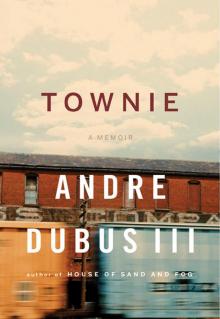 Townie
Townie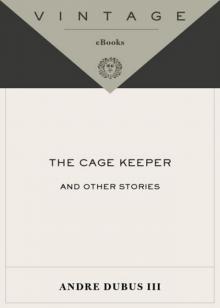 The Cage Keeper and Other Stories
The Cage Keeper and Other Stories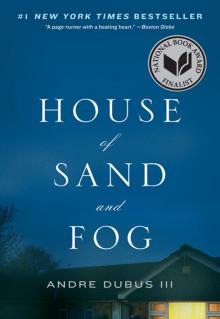 House of Sand and Fog: A Novel
House of Sand and Fog: A Novel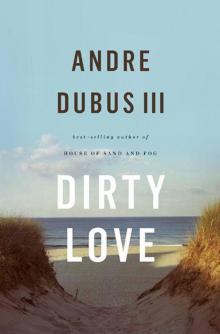 Dirty Love
Dirty Love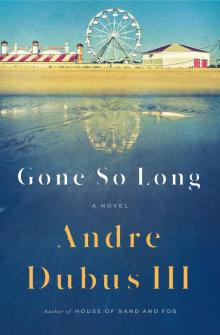 Gone So Long
Gone So Long The Garden of Last Days
The Garden of Last Days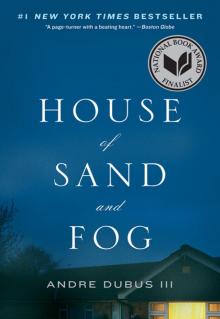 House of Sand and Fog
House of Sand and Fog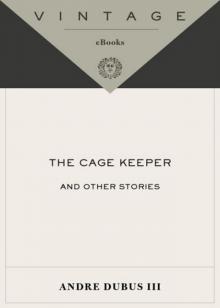 The Cage Keeper
The Cage Keeper